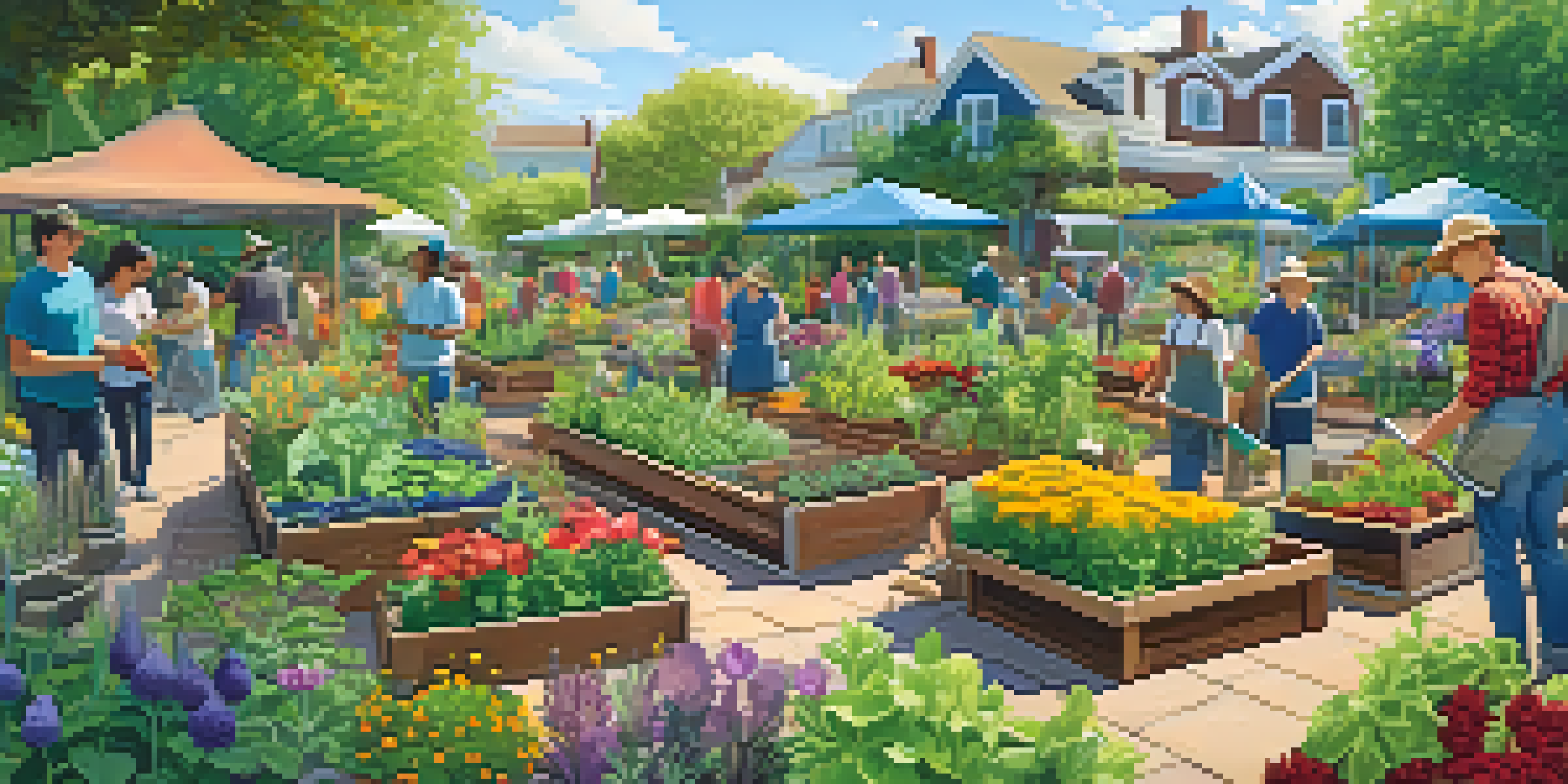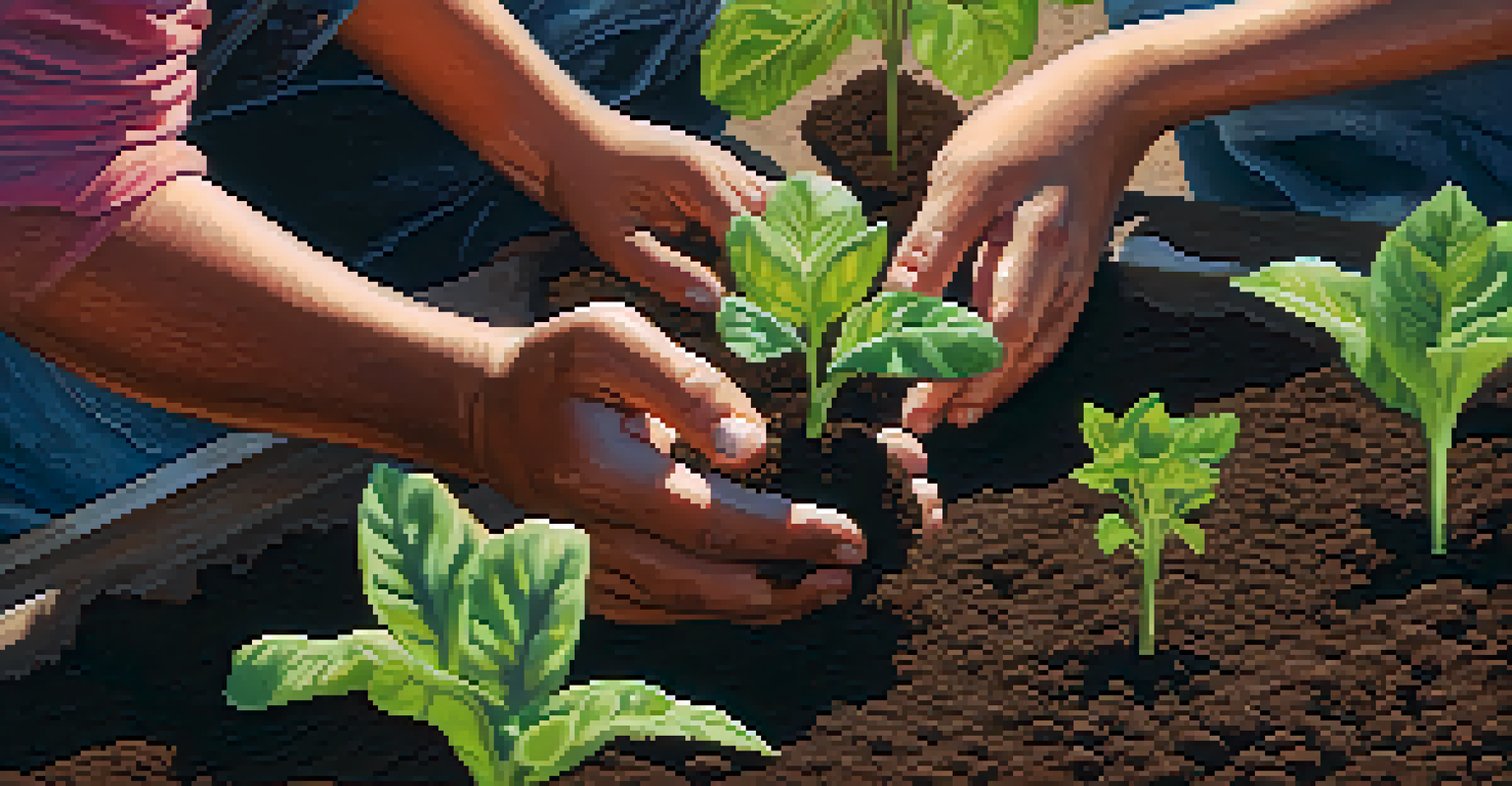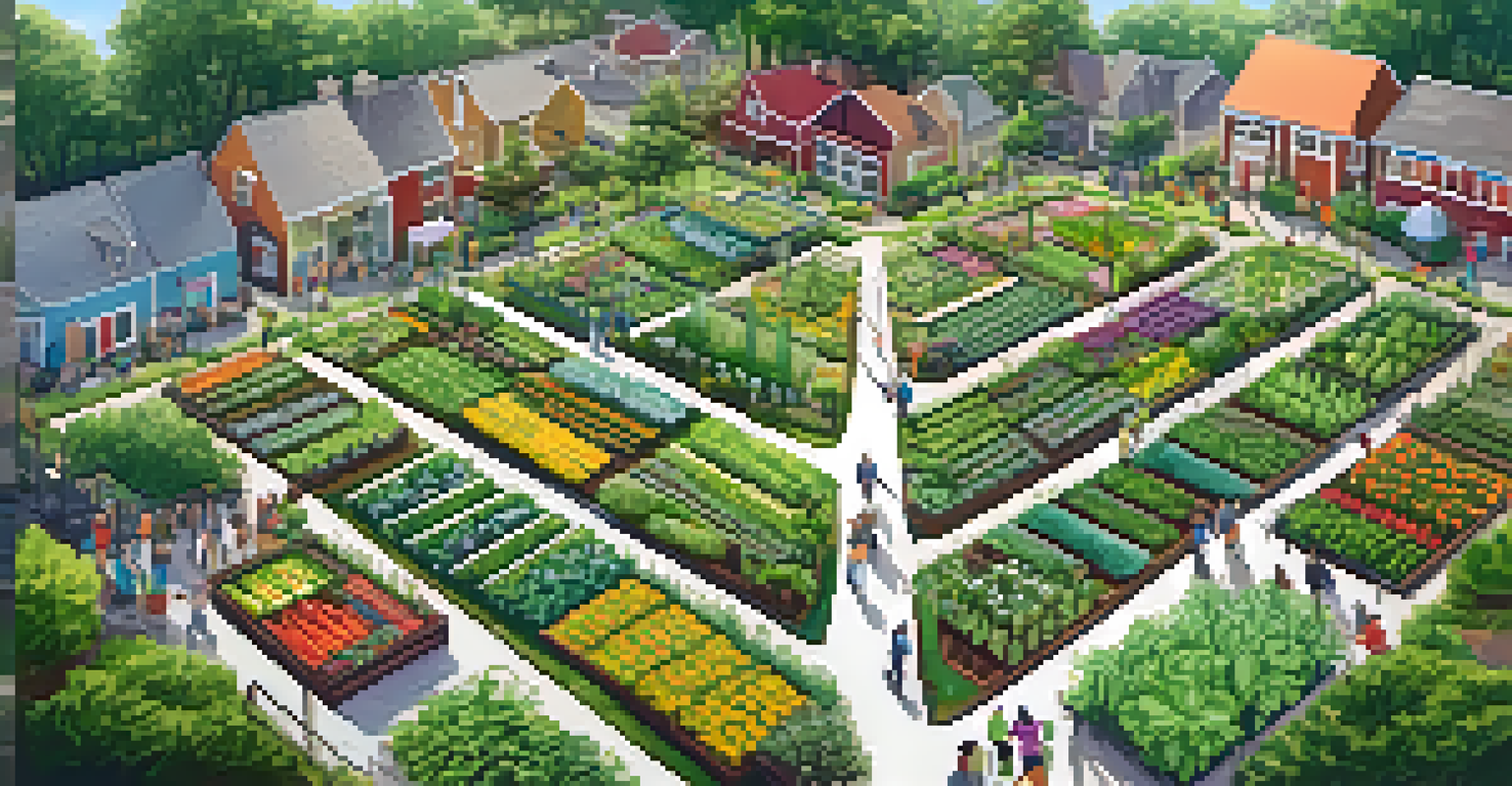The Benefits of Collaborating in Community Gardening Projects

Fostering Community Connections Through Gardening
Community gardening isn't just about growing plants; it's about growing relationships. When people come together to cultivate a shared space, they naturally bond over their common goals and aspirations. This sense of community can create lasting friendships and support networks that extend beyond the garden.
Gardening is a way of showing that you believe in tomorrow.
Working side by side, gardeners share stories, tips, and laughter, making the experience enjoyable and enriching. These connections often lead to stronger community ties, as neighbors become more invested in each other's lives. Ultimately, a community garden can transform a neighborhood from a collection of houses into a thriving, interconnected community.
Moreover, these relationships foster a sense of belonging, which is crucial for mental well-being. Feeling connected to others can reduce feelings of isolation and promote a sense of pride in one’s community, creating a happier, healthier environment for everyone involved.
Promoting Healthier Lifestyles Through Gardening
Participating in community gardening can significantly improve physical health. Regular gardening activities provide a great workout, engaging muscles and promoting cardiovascular health. Plus, the fresh produce grown can encourage healthier eating habits, contributing to better overall nutrition.

Gardening also has mental health benefits. Spending time outdoors, surrounded by nature, has been shown to reduce stress and anxiety. The act of nurturing plants can be therapeutic, providing a calming routine that helps individuals unwind from the pressures of daily life.
Building Community Through Gardening
Community gardening fosters relationships and a sense of belonging, transforming neighborhoods into interconnected communities.
Additionally, community gardening often focuses on organic practices, which can lead to healthier food choices. By growing their own fruits and vegetables, community members gain access to fresh, chemical-free produce, enhancing their diets and overall well-being.
Encouraging Environmental Awareness and Sustainability
Community gardening is a powerful tool for promoting environmental sustainability. Participants learn about organic gardening practices, composting, and the importance of biodiversity, all of which contribute to a healthier ecosystem. By engaging in these practices, gardeners help to protect local flora and fauna.
The best time to plant a tree was twenty years ago. The second best time is now.
Furthermore, community gardens often utilize sustainable techniques, such as rainwater harvesting and permaculture principles. These practices not only benefit the garden itself but also educate participants about their impact on the environment. As people become more conscious of their ecological footprint, they are likely to make more sustainable choices in their everyday lives.
In essence, community gardening fosters a culture of environmental stewardship. As individuals witness the positive impact of their gardening efforts, they are inspired to advocate for sustainability in other areas of their lives, creating a ripple effect that can benefit the entire community.
Building Skills and Empowering Individuals
Community gardening serves as an excellent platform for skill development. Participants can learn everything from planting techniques to pest management, enhancing their gardening knowledge. This hands-on experience empowers individuals to take pride in their abilities and boosts their confidence.
Moreover, community gardens often host workshops and events, providing opportunities for further education. These gatherings can cover a range of topics, such as cooking demonstrations, nutrition education, and sustainable gardening practices, equipping participants with valuable skills they can apply in their own lives.
Promoting Health and Well-Being
Participating in community gardening enhances both physical and mental health through exercise, fresh produce, and social interaction.
By fostering a learning environment, community gardening projects help individuals grow not only as gardeners but also as informed citizens. This empowerment can lead to greater community involvement and a stronger sense of agency, as people feel capable of making a difference.
Enhancing Local Economies Through Gardening Initiatives
Community gardening can have a positive impact on local economies. By growing their own food, individuals can reduce grocery bills, allowing them to allocate resources to other local businesses. Furthermore, surplus produce can be sold at farmers' markets or community events, providing an income source for gardeners.
These gardening initiatives can also attract visitors and tourists to the area. A vibrant community garden can serve as a focal point for events and activities, drawing people in and stimulating local commerce. This influx of visitors can support nearby shops and restaurants, further strengthening the local economy.
Additionally, community gardens often partner with local organizations and businesses, creating a network of support. These collaborations can lead to funding opportunities, shared resources, and joint events, making the community garden a vital part of the economic landscape.
Cultivating Cultural Exchange and Diversity
Community gardening projects can serve as a melting pot for diverse cultures and backgrounds. By bringing together individuals from various walks of life, these gardens foster cultural exchange and understanding. Participants can share traditional gardening techniques, recipes, and stories, enriching the community's collective knowledge.
This cultural diversity can lead to the cultivation of unique plants and produce that reflect the community's heritage. For example, a garden might include a variety of herbs, vegetables, and fruits from different cultures, promoting biodiversity and culinary exploration. These shared experiences can create a sense of unity among participants.
Encouraging Sustainability and Skills
Community gardens promote environmental awareness and skill development, empowering individuals while fostering a culture of sustainability.
Moreover, celebrating this diversity through gardening can break down barriers and dispel stereotypes. As people work together toward a common goal, they develop mutual respect and appreciation for one another, ultimately creating a more inclusive and harmonious community.
Boosting Mental Well-Being Through Nature and Community
Engaging in community gardening can significantly boost mental well-being. The simple act of being in nature has been linked to reduced feelings of stress and anxiety. By participating in a community garden, individuals can escape the hustle and bustle of daily life, finding solace in the tranquility of their surroundings.
Moreover, the social aspect of community gardening plays a crucial role in mental health. Being part of a group working toward a common goal fosters a sense of belonging and support, which can be incredibly uplifting. This camaraderie can help combat feelings of loneliness and isolation, creating a more resilient community.

Additionally, nurturing plants and witnessing their growth can instill a sense of purpose and accomplishment. As individuals take pride in their contributions to the garden, they experience a boost in self-esteem and overall happiness, making community gardening a powerful antidote to the stresses of modern life.